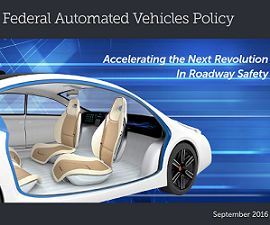DOT Draws Praise for Connected Car Guidelines

The smarter way to stay on top of broadcasting and cable industry. Sign up below
You are now subscribed
Your newsletter sign-up was successful
The Department of Transportation’s just-released guidelines for connected car safety, which includes privacy and cybersecurity safety, was drawing strong reviews inside the Beltway.
"We welcome the clear delineation of federal versus state responsibilities within the guidelines, the long-term focus on modernizing existing federal tools, and ensuring that the guidelines create a flexible process as the technology develops further," said TechNet president Linda Moore. "We look forward to participating in the discussion going forward so that we can ensure automated vehicle technology can continue to develop for the benefit of American drivers.”
“We’re encouraged by NHTSA’s transparent, collaborative approach to developing these guidelines for the next generation of vehicular technology, but as always the devil is in the details," said Energy and Commerce Committee chairman Fred Upton (R-Mich.) and Commerce, Manufacturing, and Trade Subcommittee chairman Michael Burgess (R-Texas). "We will continue to engage all stakeholders, monitor developments, and welcome continued safety innovations,” they said. “Incredible advancements in technology hold great promise to save lives, improve mobility, vehicle efficiency, and transportation accessibility for underserved communities. The stakes are high with self-driving cars, and it’s important the necessary care is taken to get this right.”
"Today marks a pivotal point for the future of transportation," said Information Technology Industry Council VP Vince Jesaitis. "The U.S. Department of Transportation 15-point safety guidelines being released represent a proactive approach that will drive innovation and bring self-driving cars to a road near you…. The guidelines also end the uncertainty and regulatory patchwork which has hung over autonomous vehicles and their development beyond science-fiction and into reality. While we are still fully digesting the new guidance, it appears to take some very positive steps to provide certainty for the private sector to move forward and increase the commitment of significant resources needed to usher in the life-improving benefits this transformational technology offers for safety, efficiency, and quality of life."
"Today’s federal guidance aligns with several core Intel principles: Our company’s vision for the future of transportation is one of zero accidents, mobility for all, environmental sustainability, reduced congestion, increased efficiency, as well as a regulatory environment that encourages innovation to evolve at the pace of technology, ensuring U.S. global leadership," said Margie Dickman, global director and managing counsel of IoT policy at Intel.
The smarter way to stay on top of broadcasting and cable industry. Sign up below
Contributing editor John Eggerton has been an editor and/or writer on media regulation, legislation and policy for over four decades, including covering the FCC, FTC, Congress, the major media trade associations, and the federal courts. In addition to Multichannel News and Broadcasting + Cable, his work has appeared in Radio World, TV Technology, TV Fax, This Week in Consumer Electronics, Variety and the Encyclopedia Britannica.

